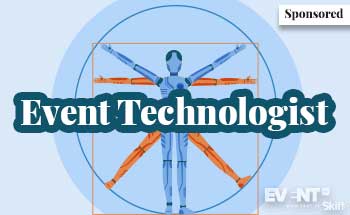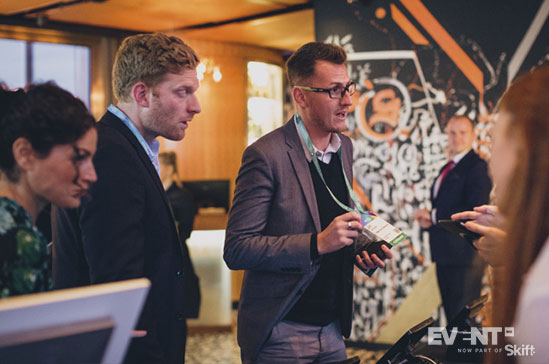Skift Take
Event technology has given event planners more opportunities and more to contend with than ever before, and a new role is emerging to help them take advantage: the event technologist. Here are four reasons to consider one.


Between event apps, registration software, and other online tools, technology has changed the face of events. Nevertheless, only 20% of eventprofs would describe themselves as tech-savvy according to a recent study. Given the importance of tech to modern events, how can planners ensure that they’re efficiently incorporating and capitalizing on the latest event technology in their events?
In recent years, the events industry has seen the development of the event technologist role to complement that of the event planner. As additions to an events team, event technologists are responsible for managing the sourcing and implementation of technology and the inclusion of tech in high-level strategies.
They allow planners to concentrate on tasks that suit their particular skill sets and leverage their expertise to provide more effective data and reporting—empowering planners to make better-informed decisions and gain more strategic roles within an organization. Event technologists are shaping up to be an important inclusion to events teams—whether in-house or outsourced—to account for the growing demand for and value of tech at events.
In this post, we’ll take a closer look at the role of an event technologist and the value they can add to an events team, as well as how to hire an event technologist and the main benefits of outsourcing this job versus hiring for one in-house.


What is an Event Technologist?
The role of event technologist is new and still emerging, so its duties and responsibilities are not clearly defined across the industry. What is clear is the vital role that tech now plays in events – especially when it comes to capturing and reporting key event data, which is used by planners to make adjustments or improvements as well as prove event ROI to stakeholders.
As such, the event technologist role aims to address the current need for more effective data collection and analysis: according to a recent Cvent report, 81% of event professionals say integrating attendee data is extremely/very important, but only 20% feel their organizations are extremely/very effective at this integration process. In addition, 62.6% of event planners predict that their use of event technology will increase. This represents a huge gap to be filled—and the event technologist does just that.
In broad terms, their role is to oversee and manage all tech-related aspects of the event planning and execution process, including data collection, analysis, and reporting. An event technologist understands event operations and specializes in technology, digital trends, and use cases to effect an end-to-end tech strategy (from online registration platform/website to feedback collection).
The role also likely includes RFP processing and vendor sourcing, R&D, and on-site support as needed. Companies are increasingly looking to hire for this role in-house but also have the option to outsource depending on their event needs.
4 Benefits of Employing an Event Technologist
Whether you decide to outsource or are considering hiring an in-house event technologist, there are several advantages to including the role on your event team. Here are four major benefits to be aware of.
Specialization
Event technologists are comfortable with the event technology landscape and are thus particularly well-suited to manage the tech and data components of events. This leads to increased specialization within event teams and more efficient implementation of technology that’s aligned with the organization’s objectives and strategy.
Improved data analytics
A key aspect of the event technologist role is determining how event goals are demonstrable through data, as well as more efficient and successful ways to collect it. As such, event technologists can help demonstrate ROI and justify spend through feedback and analytics. They can also liaise with suppliers more effectively and ensure that data needs are identified and met.
Streamlined workflows
Adding an event technologist to the mix takes tech off the planners’ plates and helps streamline team workflows, with different roles effectively managing their areas of expertise. This allows planners to spend more time and effort on strategic, high-level aspects of the planning process.
More efficient vendor sourcing
An event technologist facilitates efficient vendor sourcing as vendors can deal directly with the end-user. This helps ensure that the best-suited suppliers are contracted and increases the potential for solid long-term relationships, leading to an overall improved ROI and better event performance for planners.


To Outsource or Not to Outsource
Event technologist jobs are still largely outsourced, but it’s becoming more and more enticing for companies to add them to their in-house teams. Deciding whether to outsource or hire in-house will depend on a variety of factors unique to each organization, such as the size of their event program, complexity of their data security concerns, and current technology setup.
Hiring In-House
In-house event technologists in particular can add a lot of value to and solve various issues for an organization. With a deeper understanding of company culture, values, and goals, internal hires can help move projects forward more easily and consistently, especially if an organization’s event program involves multiple events across different departments. This presents several opportunities to economize on traditionally less efficient processes: an in-house team member who is integrated into the company ecosystem will face fewer checkpoints and barriers for approval, and will have an easier time getting buy-in and sign-off on decisions.
In-house event technologists are also in a better position to make tech sourcing decisions unencumbered by any preferred vendor arrangements an outside organization (read: agency) might have. They’re able to evaluate and select suppliers in an unbiased way based on who is most qualified for the job and best fits the company’s vision.
In-house event technologists can also be beneficial to companies that own event software and are looking to internalize the management of it. Hiring an internal event technologist to oversee software allows for more control over the design and the ability to directly handle any necessary changes to the back-end. This helps streamline the implementation of the event software as it eliminates the need for an agency (or multiple agencies) to perform this role.
Moreover, control and security are often major concerns for companies. Hiring an in-house event technologist rather than an agency provides companies with more control over their data and ensures that no residual data is left with an agency after the event. In addition, taking responsibility for tech and security compliance makes it easier to guarantee said compliance because it allows you to track how the data arrives, is stored, and is disposed of.


When to Outsource
In certain cases, outsourcing an event technologist may be a more suitable option. This is particularly true if you’re not actually sure if you need one or what the potential benefit could be. Outsourcing can be a good way to determine an event technologist’s value, what the role would look, and how one might fit into your broader workflows and processes before you make a bigger commitment to make an internal hire.
If you have decided to go with an event technologist, outsourcing can also help you to determine what skills and qualities you should look for before starting your search. Hiring and onboarding can be a huge investment, particularly for such a specialized role. Working with a reputable agency of experienced event technologists will give you the experience you need to have intelligent conversations about your needs and expectations before you potentially hire the wrong candidate.
Of course, not all companies host numerous large, tech-heavy events on a regular basis. If your tech needs are rather inconsistent across your events, you may consider hiring an event technologist on an as-needed basis or as a consultant to set up your event tech stack. Moving forward, you can then utilize the stack that’s already been set up or bring on an event technologist for as needed if any additional needs come up.


Hiring an Event Technologist
Once you’ve decided to move forward with hiring an event technologist, there are a few considerations to keep in mind.
Have a tech strategy in place.
Before you start looking for an event technologist and evaluating candidates, make sure you have defined your technology goals the event technologist’s role in achieving them.
Define what you’re looking for.
When creating a job description, be as specific as possible about your must- and nice-to-haves. Candidates should be analytically-minded, able to learn quickly and adapt to changing trends, comfortable working in a team, and self-directed enough to take initiative, solve problems, and implement solutions independently. That said, the position is still fairly undefined within the industry, which translates into more freedom in customizing the role for your organization’s specific needs.
When outsourcing, you can be more specific in requesting experience in your particular event niche. Conversely, when hiring in-house, you may need to broaden your expectations and look for someone with general event technologist skills and experience, and then nurture them within your niche once you hire them.
Create an onboarding/training program.
This is especially important given the unstandardized nature of the role. You need to ensure that the team understands the event technologist’s scope of work and how to utilize their expertise. (Asking an expert in event technology to reformat your harddrive is probably not a good use of resources.)
You should also incorporate training for certain tools within your existing event tech stack, technology strategy, and event portfolio.
Ask for references.
Of course, you should always require references from job candidates and verify them. Particularly when outsourcing, the candidate should have examples of very similar previous work completed for other clients that you can evaluate to gauge if the applicant is a good fit for your needs.
Consider analytics/reports.
While this may be more difficult for internal candidates, try to obtain specific performance reports (particularly for external hires). This will help you further assess the candidate’s capabilities and potentially justify the hire to other internal teams or stakeholders.
IN CONCLUSION
Technology is now the backbone of many event planning processes, but there is a lack of confidence in the industry when it comes to implementing tech and collecting data. Event technologists have emerged to meet the need for tech and digital expertise in the event space. They can help support attendee experience and overall strategy goals through technology.
For more information on event technologists and how to hire one, download the full report or contact Cvent for personalized advice and comprehensive technology solutions for your next event.






